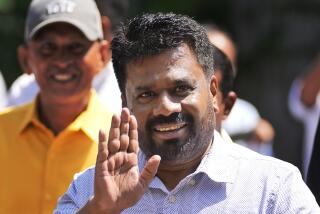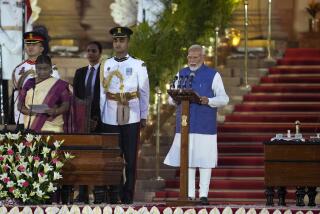Gandhis Return to Power in India
- Share via
NEW DELHI — Opposition leader Sonia Gandhi and her allies delivered a surprising election defeat to Prime Minister Atal Behari Vajpayee’s ruling party Thursday, plunging India into political uncertainty that may threaten economic reforms and peace talks with Pakistan.
Vajpayee resigned after his party lost about a quarter of its parliamentary seats. Gandhi, the Italian-born widow of assassinated Prime Minister Rajiv Gandhi, claimed a mandate to govern -- a political act that many Indians thought would never happen.
To form a government, the 57-year-old Gandhi must secure the backing of Communist-led leftists, who are likely to demand significant changes in India’s willing embrace of capitalism, analysts said.
If Gandhi becomes prime minister as expected, she will revive a family dynasty dating to the country’s birth 57 years ago. And she will be India’s first foreign-born leader since Britain granted the subcontinent independence in 1947.
The Gandhi dynasty appeared more entrenched Thursday with the election of her 33-year-old son to Parliament.
The prospect of a foreign-born prime minister angered many nationalist supporters of Vajpayee’s ousted alliance, whose leaders vilified Gandhi’s Italian roots during the hard-fought campaign.
During Vajpayee’s seven-year rule, India achieved record economic growth and became a global power in information technology.
His defeat appeared to have resulted in part from a backlash by masses of impoverished voters who felt excluded from recent economic gains.
A Gandhi government is likely to maintain close ties to Washington, but she will probably approach peace talks with Pakistan less urgently, said political analyst Pran Chopra.
“Vajpayee had staked his own place in history on resolving the problems with Pakistan,” said Chopra, an advisor at the Center for Policy Research, a New Delhi think tank. “That will probably not be high up on the agenda of Sonia Gandhi.”
More than half of 670 million eligible voters cast ballots on electronic machines in four phases over three weeks to allow security forces and election officials to move around the country of more than 1 billion people.
Exit polls reported at each stage of the voting suggested that Vajpayee’s ruling National Democratic Alliance was in trouble, but final results turned out worse than the predictions.
The Congress Party and its allies won 219 seats to the National Democratic Alliance’s 188 seats in the 543-seat lower house, according to unofficial results Thursday night.
Vajpayee’s Bharatiya Janata Party was expected to be the largest single party in Parliament’s lower house, called the Lok Sabha. But Gandhi’s party won on that score too, a stunning comeback for a party and leader written off as chronic losers a few weeks ago.
Long before Vajpayee called the election six months early, his party officials were publicly suggesting that Gandhi was unfit to be prime minister because India was her adopted country, and she took 14 years to become an Indian citizen.
The BJP suggested a constitutional amendment to restrict the prime minister’s post to citizens born in India. When voting began April 20, many political analysts predicted that Gandhi would lead her party toward the electoral cliff.
While many commentators wrote Gandhi’s political obituary, she fought hard in a grueling schedule of campaign rallies across the country.
In its “India Shining” campaign, the BJP-led alliance trumpeted India’s 8% economic growth and new confidence in the world, telling voters that Gandhi’s Congress Party threatened the country’s bright future.
Gandhi accused Vajpayee’s alliance, which is dominated by Hindu nationalists, of fomenting religious hatred and betraying India’s poor and its secular past by pushing through economic reforms that benefited the middle class.
That message appeared to have resonated with many voters, who helped left-wing parties achieve one of their best results in a national election.
Gandhi told reporters Thursday night that the next prime minister would be decided by a vote in Parliament, as early as Saturday. She did not say whether she wanted the post, but her tough campaign left little doubt she appeared ready to lead India.
“We are going to work with all like-minded people,” she said.
The Communist Party of India (Marxist), which has promised to provide the support Gandhi needs to form a coalition government, said Thursday that it would not object to her becoming prime minister.
“We don’t have an opinion regarding the prime ministership of Sonia Gandhi,” Jyoti Basu, leader of the CPI(M) and former chief minister of West Bengal state, said in Calcutta.
“The Congress [Party] should decide on that.... We don’t have a problem.”
As negotiations with the Congress Party began Thursday, Communist leaders said they would not decide their demands for supporting Gandhi until the party’s politburo and central committee had met over the weekend.
Many wondered how long Gandhi could hold any coalition together against inevitable arguments over how to reform an economy weighed down by regulation and state ownership.
“I don’t think that this honeymoon between the Congress and the Left Front Alliance is going to last for a long time,” political scientist Amal Mukherjee said in Calcutta, where Communists continue to govern after winning elections for decades.
“The reason is very simple: In West Bengal, the Left Front -- which has been opposing the Congress -- has always held the Congress responsible for all the ills of the state.”
Observers will wait to see how Gandhi deals with Pakistan, its nuclear-armed neighbor.
Vajpayee took India to the brink of war with Pakistan, only to begin a peace process. Talks with Pakistan are due to begin after India forms a new government.
Gandhi is likely to resist the compromises Pakistan’s President Pervez Musharraf wants on the dispute over Kashmir, but Vajpayee would have faced the same issue in the talks, Chopra said.
Chopra blamed the BJP’s defeat on local issues in key swing states, such as Tamil Nadu and Andhra Pradesh, and Vajpayee’s failure to build support for economic reforms among India’s poor. An estimated 350 million people survive on less than $1 a day.
Almost half of the assembly seats that the BJP lost were in Tamil Nadu and Andhra Pradesh, and another third in Gujarat, which was rocked by communal riots that left hundreds dead and thousands homeless in early 2002.
Muslim victims of mob violence and human rights groups accused state Chief Minister Narendra Modi, a Hindu hard-liner, and his government of complicity in attacks on Muslims, which many witnesses said were carried out as police stood by.
The Congress Party dominated India’s politics from the country’s birth in 1947. The first prime minister, Jawaharlal Nehru, ruled until 1964. Two years later, his daughter Indira Gandhi took power, and she remained prime minister until 1984. She was briefly out of office from 1977 to 1980.
Her son, Rajiv, reluctantly became prime minister after his mother’s bodyguards assassinated her in 1984. He was assassinated in 1991 during an election campaign.
His son, Rahul Gandhi, won a seat in Parliament on Thursday in his first run for public office. He was elected in the family’s traditional stronghold of Amethi, in the state of Uttar Pradesh.
Gandhi won a seat that was once held by his grandmother, father and mother. Gandhi, who showed surprising charisma on the campaign trail, appears to be the ideal heir to his family’s political dynasty.
He is a Harvard graduate who owns a computer consulting company. He has spent many years in the U.S. and Britain and has a Colombian girlfriend. But he may face a challenge from his younger sister, Priyanka, who is considered more politically ambitious, though she waited out this election.
In an address to the nation, the 79-year-old Vajpayee told Indians it was up to them, and history, to decide what his government had achieved.
“My party and alliance may have lost, but India has won,” said Vajpayee, who several times had threatened to quit before running for reelection. He isn’t likely to become the opposition leader.
Special correspondent Shankhadeep Choudury in Calcutta contributed to this report.
More to Read
Sign up for Essential California
The most important California stories and recommendations in your inbox every morning.
You may occasionally receive promotional content from the Los Angeles Times.










